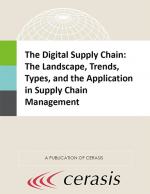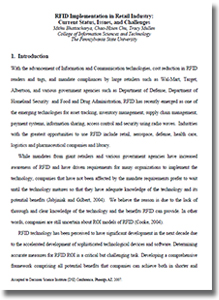RFID Implementation in Retail Industry: Current Status, Issues, and Challenges
In this paper we study the current status, drivers, benefits, challenges, and strategy to adopt RFID in retail industry via content analysis. We develop an integrated framework of RFID adoption to lead our analyses and interpretation.
With the advancement of Information and Communication technologies, cost reduction in RFID readers and tags, and mandate compliances by large retailers such as Wal-Mart, Target, Albertson, and various government agencies such as Department of Defense, Department of Homeland Security and Food and Drug Administration, RFID has recently emerged as one of the emerging technologies for asset tracking, inventory management, supply chain management, payment systems, information sharing, access control and security using radio waves.
Industries with the greatest opportunities to use RFID include retail, aerospace, defense, health care, logistics and pharmaceutical companies and library.
While mandates from giant retailers and various government agencies have increased awareness of RFID and have driven requirements for many organizations to implement the technology, companies that have not been affected by the mandate requirements prefer to wait until the technology matures so that they have adequate knowledge of the technology and its potential benefits (Jabjiniak and Gilbert, 2004). We believe the reason is due to the lack of thorough and clear knowledge of the technology and the benefits RFID can provide. In other words, companies are still uncertain about ROI models of RFID (Cooke, 2004).
RFID technology has been perceived to have significant development in the next decade due to the accelerated development of sophisticated technological devices and software. Determining accurate measures for RFID ROI is a critical but challenging task.
Developing a comprehensive framework comprising all potential benefits that companies can achieve both in shorter and longer terms will contribute toward the development of ROI measures. In this paper we have attempted to develop such a framework for the benefits obtained from implementing RFID in the retail supply chains.
What’s Related




Favorites





